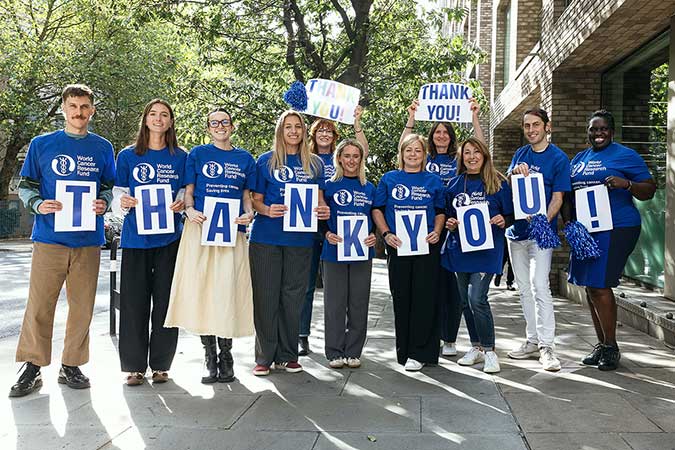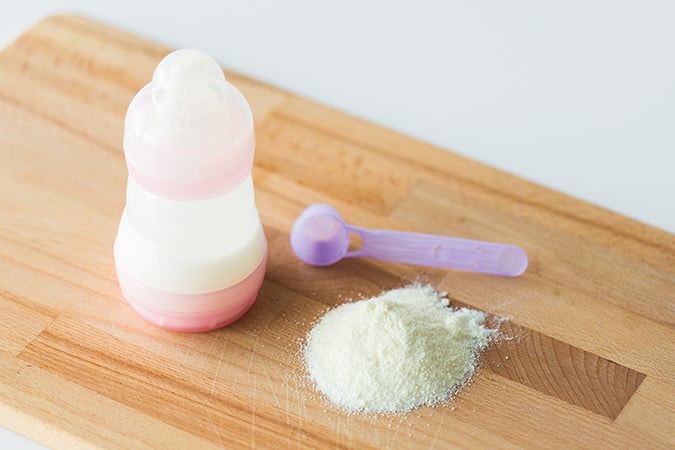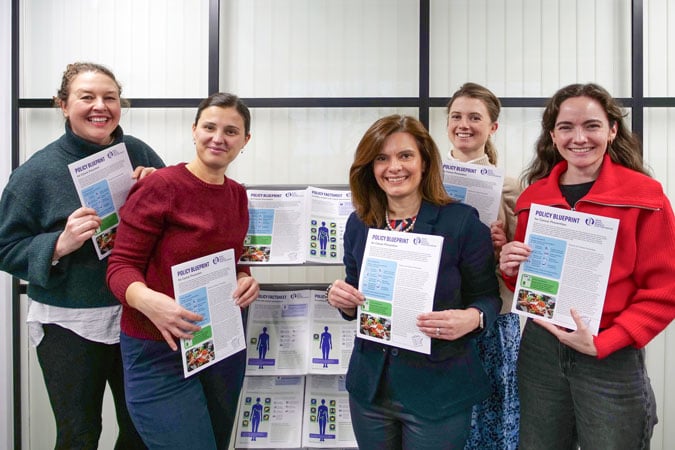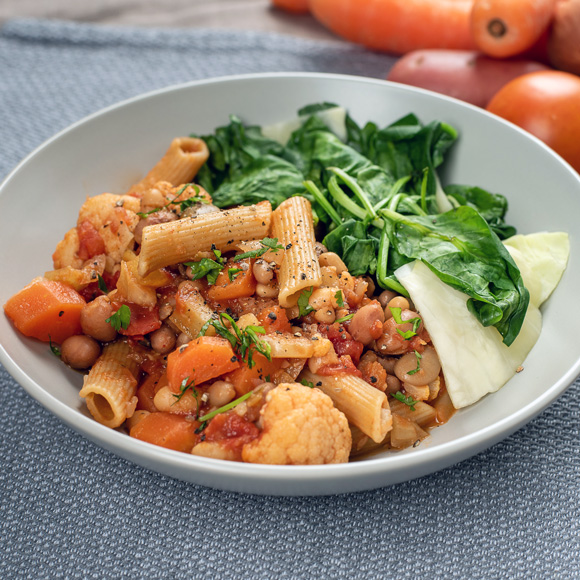Since 2017, my team and I have been working on a project entitled OCTOPUS: Obesity and Cancer TOgether imPact Upon Survival. We’re looking at the relationship between excess weight – measured by body mass index (BMI) – and survival in 2 common cancers.
Bowel and womb cancer linked to obesity
For the purposes of the study, we’re concentrating on bowel and womb cancers, because they’re high on the list of obesity-related cancers. So if we’re going to notice a signal between excess weight in patients who develop a cancer and a worse survival rate, we’d expect to see it in these 2 cancers.
It’s worth pointing out the obesity context in which we’re working. Over 60% of the UK population now falls into the category of ‘overweight’ and obese’, as quantified by a BMI of greater than 25, while obesity rates generally are rising around the world.
Obesity is the 2nd largest preventable cause of cancer after smoking. World Cancer Research Fund’s report, Diet, nutrition, physical activity and cancer: a global perspective, has established obesity as a risk factor for 12 different cancers including those of the bowel, womb, liver and pancreas.
Now, we know that excess weight increases the risk of developing certain cancers such as those above, but we don’t really know how much body fatness influences the survival of the patient after they’ve been diagnosed with cancer. That is the question we’re addressing in this study – we’re exploring post-diagnosis scenarios.
Previous studies have tried to take BMI into account but they haven’t been able to provide convincing evidence that body fatness matters, because they’ve run into problems concerning “confounding” and “biases”.
In layman’s terms that might mean, for example, that a patient who is overweight may present with a cancer, but because of their excess weight they may have more complications after surgery or receive less aggressive cancer therapies.
They may be selected differently, or selected for different treatments, and their excess weight may affect how well they get on, or even whether they reach completion of those treatments.
Chemotherapy, for example, might be delayed or it might be underdosed because of their excess weight. And there may be other issues caused by excess weight such as heart disease or diabetes.
The net effect is that obese patients might appear to have a worse survival rate, but it might not be due directly to their body weight.
Drilling down into the detail
The OCTOPUS project aims to collect and analyse data from trials around the world, to test how bowel and womb cancer patients with significantly higher BMI measurements compare with patients with lower readings.
The data we’re accessing is rich and varied, whether it’s about chemotherapy dosage, tolerance or intolerance to treatments, or complications encountered. By drilling down to a level of detail that hasn’t really been achieved before, we want to tease out whether patients fare worse because they’re overweight or because other things happened to them along the way.
Of course I understand that it’s important to give my patients good general advice about living healthily, but the reason I’m excited about this project is because I want to give them a solid scientific basis for that advice.
I want the study to help us – using evidence – to encourage people living with excess weight or obesity to make cancer-reducing lifestyle choices, lose weight and increase survival rates.
What motivates me is that every other week I’m in the clinic seeing patients I’ve operated on, and they need lifestyle advice. They come back to us for the first 5 years, and they want to know what to do.
As a surgical oncologist, I want to be able to look them in the eye and say, “Yes, we believe dietary changes can make a difference because we have done this research”.
We want to do research, not admin
World Cancer Research Fund has been invaluable in the OCTOPUS project, not only because it has provided the financial support needed to put the relevant manpower in place, but also because of the way it communicates with us.
It works alongside other donors that we work with, it makes the effort to come and see what we’re doing, it disseminates its findings, and it has a flexible approach to how our budget is run. For me that’s really important – we want to spend our time doing research, rather than being administrative officers.
In a nutshell, World Cancer Research Fund is excellent at getting the message behind its brand, and the message behind our work, out into the wider world.
Making a difference
I want to be able to look my patients in the eye and say, ‘Yes, we believe dietary changes can make a difference because we have done this research'.
How did you get into cancer research?
I was studying human nutrition as an undergraduate at Ulster University in the early 2000s and spent my research placement year at the MRC Human Nutrition Research centre in Cambridge. By the final year of my degree, I knew I wanted to work in research and started seeking PhD opportunities.
My Mum had been diagnosed with breast cancer during my studies, and around the same time some exciting discoveries were being made in nutrition and cancer aetiology [aetiology is the branch of medical science that studies the causes of diseases and the factors that lead to their spread] by cohorts such as EPIC [European Prospective Investigation into Cancer and Nutrition based in Oxford]. I thought there was mileage in cancer as a research career choice, as well as being highly motivated by my Mum’s diagnosis.
I approached the late Prof Liam Murray, who had established a cancer epidemiology research group at Queen’s University Belfast, and was advertising for a PhD student in cancer survivorship.
After meeting to discuss this opportunity, we agreed that I wasn’t really suited to that project, but thankfully there was another PhD opportunity specifically tailored to nutrition and cancer research. To my delight, I was able to ‘scoop’ the position.
I fell in love with cancer epidemiology research and basically refused to leave – I’m now a professor in the same research centre.
Do you wear a lab coat? And if no, why not?
No, although I have submitted to wearing one during media coverage of some of my research. Apparently, the public equate cancer research with a lab coat or so the photographer insisted!
As an epidemiologist, most of my research involves data analysis and therefore I’m sitting at a computer most of the time. This doesn’t make for fun photo opportunities, but I still enjoy it.
I do collaborate with lots of cancer researchers who do wear lab coats and their work makes vital contributions to my molecular epidemiology research [this is the study of genetics and small molecules in the body across populations and their impact on disease].
What part of your research career are you most proud of?
Probably every time I have overcome rejection, which – let’s face it – can be often. One moment particularly stands out though: I was really proud of the first time I published a paper as senior author in the journal Gastroenterology in 2016.
It was a systematic review on lifestyle factors for serrated colorectal polyps [growths on the surface of the colon or rectum] and was one of the first papers that reflected me as the senior investigator that was published in such a high-impact journal. My husband even took me out to dinner to help celebrate that one.
When you were a child what did you want to be when you grew up?
I didn’t have a strong preference but I liked the idea of teaching or secretarial work. Given that lecturing and administration is a big part of being an academic, I wasn’t far off the mark!
Did you ever set fire/make anything explode in science lessons at school?
Not unless we were supposed to – I only remember burning certain elements during chemistry lessons (potassium is a purple flame, right?). I did make our microwave explode at home when I was a child though. I put micro-chips in for 30 minutes instead of three minutes… an early lesson to stay away from highly processed food, perhaps!
Thank you from Helen
I’m an Academy Fellow, which means that when I was at the start of my career, World Cancer Research Fund paid for me to go on a course related to cancer prevention. Fellowships are awarded to scientific or policy professionals at various stages of their career to broaden their knowledge of cancer prevention and survival through diet, nutrition or physical activity. Your donations help us to create experts – thank you.
How did you get into cancer research?
When I was doing my undergraduate degree, there were many dissertation projects to choose from but only one cancer project. I found the possibility of doing research that could really make a difference to people’s lives, by contributing to knowledge about one of the largest causes of death in the western world, very exciting.
Do you wear a lab coat? And if no, why not?
No, not any more. During my PhD I did a lot of lab work on samples from small, highly controlled, intervention studies. But I now lead very large epidemiological studies and any lab work we need doing is done by specialist labs.
What part of your research career are you most proud of?
Being able to do research that makes a difference to patients’ lives by informing cancer prevention and early detection strategies.
When you were a child what did you want to be when you grew up?
A vet. I went and did work experience with several vets and, as a real animal lover, I spent too much time in tears as a result of animals dying or seeing those that had been mistreated. So I decided I probably wasn’t tough enough for that route!
Did you ever set fire to anything in science lessons at school?
No, fortunately not!
Thank you from Amanda
Through your donations, World Cancer Research Fund has funded a major project to help me research the different ways in which the proportion of potentially preventable cancers is estimated.
How did you get into cancer research?
I went to medical school and studied pathology [the study and diagnosis of disease]. Usually as a pathologist, you tend to see the cancer after it is diagnosed. I became interested in preventing it rather than just diagnosing it.
I wasn’t initially interested in nutrition but I took some courses after medical school when I was doing a master’s in public health and realised the great potential for cancer prevention.
I dedicated the rest of my career to studying cancer epidemiology [a scientific method used to find the causes of health and disease in populations], especially dietary aspects.
Do you wear a lab coat?
No lab coat! My research is based on large populations rather than on basic laboratory approaches. The laboratory studies, however, are important and do inform our research. We do dietary surveys, and collect biologic specimens such as blood samples on hundreds of thousands of people. Our aim is to discover factors, especially nutritional, that may increase or lower cancer risk.
What part of your career are you most proud of?
I’m actually most proud of the mentoring part of my career. I meet so many bright, young, dedicated public health researchers who can figure out complex issues. I just provide a little guidance and perspective.
The only reason people go into cancer prevention research is that the work is interesting and the goals are to help people by lowering the risk of cancer.
A Harvard dean once said, among the various degrees one can obtain at Harvard, the only one that will lower your earning potential is one in public health. To be surrounded by people who make this decision makes work a pleasure.
When you were a child what did you want to be when you grew up?
Well, I really wanted to be a professional athlete, but I knew I had no chance of this. I grew up in a working class neighbourhood, and my parents encouraged me to do something that required book learning.
I found science and medicine interesting, though I really did not have much science exposure until high school. There, I found the science courses, especially biology, fascinating.
Did you ever set fire/make anything explode in science lessons at school?
Fortunately, I didn’t cause explosions or fires in science lessons, but I did drop a lot of things. I wasn’t handy in the lab, nor in the kitchen my wife would add.
I work mostly with a computer. I can’t always figure it out but at least it doesn’t explode.
Thank you from Ed
Through your donations, World Cancer Research Fund has funded a major project to help me research the different ways in which the proportion of potentially preventable cancers is estimated.
Why is cancer research so important to you?
We constantly see changes in dietary intake, physical activity and other lifestyle habits that are associated with cancer risk. Furthermore, 30–50% of all cancers are preventable through these lifestyle changes.
It’s therefore important to study how these lifestyle changes contribute to cancer or protect against cancer to prevent people dying from preventable cancers.
Do you wear a lab coat? And if no, why not?
No, I don’t wear a lab coat! The research I’m currently involved in doesn’t require working in labs. This is because our study is an observational study where we look at dietary data collected from quantified food frequency questionnaires.
What’s the best part of your job?
I’m still a student and so I’m not sure whether I can use the word “job”. However, I love learning and working with amazing scientists in my field from various parts of the world. I also love doing my own statistics and comparing our results with other populations.
When you were a child what did you want to be when you grew up?
Since I was a kid, I have loved the great outdoors, animals and hiking activities. I always thought that I’d be a game ranger when I was older as it was a good combination of all my favorite activities.
Luckily, I became more passionate about nutrition over the years and am very happy to be working in this field now.
Did you ever set fire to anything in science lessons at school?
I don’t recall starting a fire during any science classes in school! However, we once had to make nylon as part of a chemical practical experiment during my first year as an undergrad. Me and my lab partner just couldn’t get the nylon string to form. After several attempts we still couldn’t manage to form the string.
At the same time, we saw that someone had thrown their perfectly formed nylon string away in the dustbin. So we “borrowed” that string from the dustbin and got 90% for our chemical practical that afternoon.
Thank you from Inarie
Through your donations, World Cancer Research Fund funded my Academy Fellowship in 2019, enabling me to attend a course in the Netherlands to develop my expertise in nutrition and cancer. I'm a registered dietitian working in Bambisana Hospital, South Africa.
How did you get into cancer research?
I got involved by chance when I was a junior researcher, being asked to help set up the first and largest UK randomised controlled trial of PSA screening for prostate cancer. I took over the leadership of the project, and that led to a large programme of cancer research.
Do you wear a lab coat? And if no, why not?
No, I do not. I am what is known as a “population-based” researcher. I study large groups of people through questionnaires, blood samples, and clinical information, and through interventions like screening or lifestyle changes, and then analysing the results.
As a doctor, I am naturally drawn to studies that involve people rather than cells grown in a laboratory.
What part of your research career are you most proud of?
I’m most proud of setting up the first and largest UK randomised controlled trial of PSA screening for prostate cancer and following the study up for over 10 years now. We showed that the PSA test is a blunt tool for screening and that better methods of screening are needed.
We’re now following up the trial for 15 years. This trial helped inform policy around the world on whether or not to introduce PSA screening for prostate cancer as an organised screening method.
When you were a child what did you want to be when you grew up?
I actually wanted to be a microbiologist or a cricket player! But I was told microbiology was too difficult for me and I was a useless (but enthusiastic) cricketer, so I did medicine instead.
Did you ever set fire/make anything explode in science lessons at school?
I think I may have singed the hairs on my forearms when using the Bunsen burner!
Progress on preventing prostate cancer
Through your donations, World Cancer Research Fund has funded 3 of my projects.
How did you get into cancer research?
At school I was really torn between the sciences and the arts. I took subjects from both areas for A levels (art, chemistry, geography and biology), and ended up studying archaeology and biological anthropology as my first degree, which allowed me to pursue and combine interests in a number of areas.
I loved hypothesis generating and testing but also the lateral, more creative thinking that interdisciplinary study allowed. One of my lecturers talked about the challenge of trying to unravel the effects of different risk factors (biological and social factors) acting at different stages of life on disease.
This led me to discover, and do some research in, an area called “lifecourse epidemiology”. This inspired me to do some postgraduate studies in epidemiology [a scientific method used to find the causes of health and disease in populations].
Searching for a stimulating topic for a master’s dissertation I came across the work of the Cancer Epidemiology Unit in Oxford, who were trying to unravel the complicated webs of risk factors that affect the development of common cancers. I studied for a cancer epidemiology PhD with the group and have worked in the field ever since.
What’s the best part of your job?
Working with lots of really interesting people, who have different areas of expertise and all trying to work constructively together to understand how we might prevent a really complicated but unfortunately common disease.
How many of World Cancer Research Fund’s Recommendations do you follow?
I try to exercise regularly (by building it into my commute – I’m lucky enough to be able to cycle to work). I’m actively trying to reduce the amount of red and processed meat in my diet – both for health and environmental benefits.
When you were a child what did you want to be when you grew up?
An archaeologist. I loved mud, discovering new things and the idea of being the first to encounter objects previously handled by fellow humans centuries before. On a dig at a Roman hillfort, I once found a Roman brooch.
As I grew older, I realised that this love of solving puzzles and seeking out answers could be applied to fields that would influence our future as a species (as well as to understanding better our past), and this has stayed with me, guiding my postgraduate studies and subsequent research.
Did you ever make anything explode in science lessons at school?
Yes! In my first year of secondary school, we made the windows bulge in the chemistry labs by reacting too much sodium.
Thank you from Ruth
Through your donations, World Cancer Research Fund funded my recent project on prostate cancer, which provided the largest dataset to date on metabolites and prostate cancer risk.
Kostas is a Senior Lecturer in Cancer Epidemiology at Imperial College London, and the co-Principal Investigator of our Global Cancer Update Programme.
How did you get into cancer research?
I was interested in cancer research from the early years of my bachelor’s degree in nursing without any particular reason. When I continued postgraduate studies at Johns Hopkins Bloomberg School of Public Health, this interest exploded just by being around worldwide experts in the field like Prof Elizabeth Platz, who ended up being my PhD supervisor.
Do you wear a lab coat? And if no, why not?
No, I don’t, because I spend most of my time in front of a computer analysing and interpreting population data.
What part of your research career are you most proud of?
During the last year, I have initiated a new prospective epidemiological study in Greece, the Epirus Health Study, which is designed to investigate the aetiology [the study of the causes of a disease] of complex multifactorial diseases in Greece and I perceive this study as my ‘scientific child’.
When you were a child what did you want to be when you grew up?
Many different things at different ages! I was driven to the medical profession later in adolescence.
Did you ever set fire/make anything explode in science lessons at school?
I don’t think I did …





